A Year in Radical Hospitality
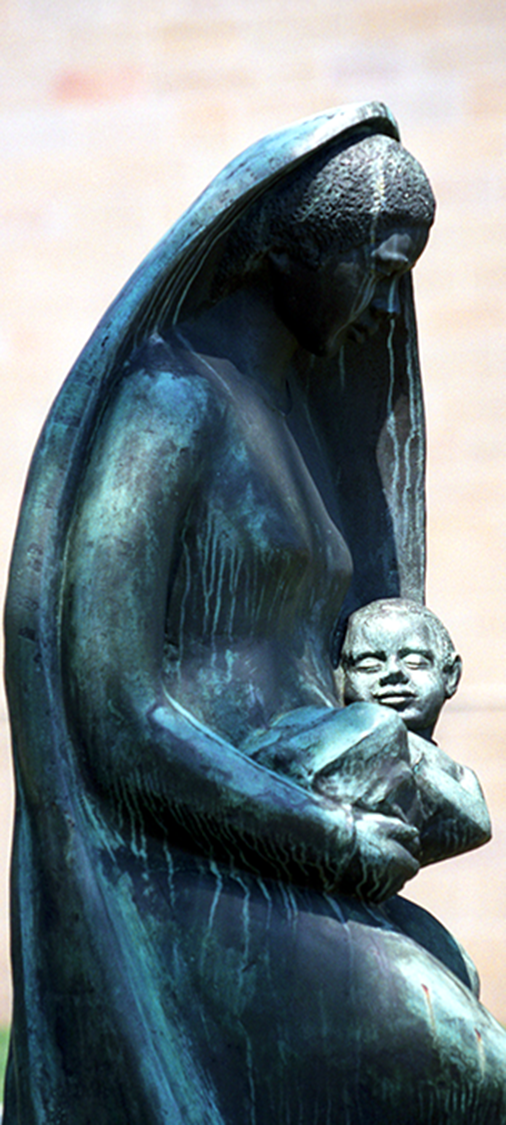
A Year in Radical Hospitality
From the Mission Effectiveness Team
Radical Hospitality is the intentional welcoming of those we know and those we don’t yet know into a community of belonging. A core value in every major religious tradition (and a common theme in folklore and mythology), hospitality means opening doors to both neighbor and stranger. In the Mercy and Jesuit traditions, we are asked to embrace the stranger as our neighbor, in the spirit of love, mercy, and justice.
In honor of this year’s mission theme of Radical Hospitality, the Mission Effectiveness Team is working to highlight various ways that a culture of inclusion, welcome, and belonging is fostered by members of our University community. In this series, we highlight individuals, places, programs, and events that embody Radical Hospitality and inspire all of us to live out this critical aspect of our mission.
If you would like to write or propose a feature for “A Year in Radical Hospitality,” email MET co-chairs Assistant Professor Ashlee Barnes and Associate Professor Mary-Catherine Harrison.
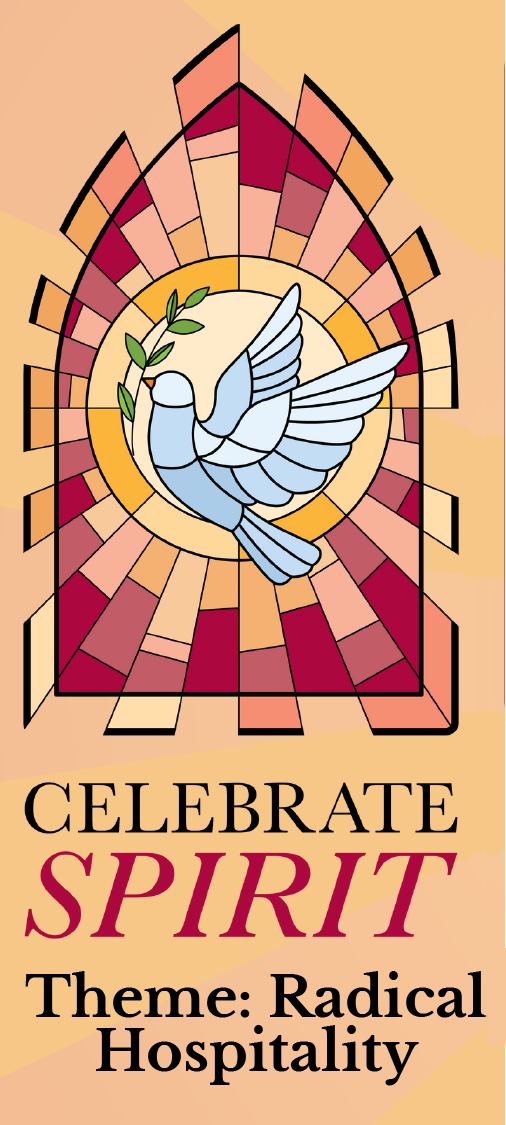
Judy Mouch, RSM: A life of serving others through Radical Hospitality
By Lori Glenn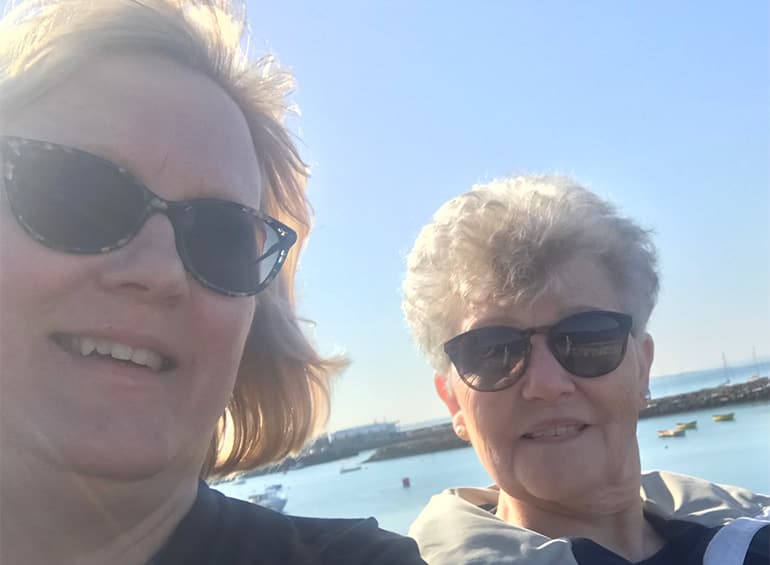 Sisters of Mercy foundress Catherine McAuley believed that hospitality was essential to her spirituality. With McAuley's leadership and dedication, the House of Mercy in Dublin welcomed countless vulnerable persons, providing shelter, food, education and love. When we think of the Sisters of Mercy, we envision a comfortable cup of tea. This saying is said to have originated as one of McAuley's final messages: “Now fearing that I might forget it again, will you tell the sisters to get a good cup of tea…when I am gone and to comfort one another. But God will comfort them.”
Sisters of Mercy foundress Catherine McAuley believed that hospitality was essential to her spirituality. With McAuley's leadership and dedication, the House of Mercy in Dublin welcomed countless vulnerable persons, providing shelter, food, education and love. When we think of the Sisters of Mercy, we envision a comfortable cup of tea. This saying is said to have originated as one of McAuley's final messages: “Now fearing that I might forget it again, will you tell the sisters to get a good cup of tea…when I am gone and to comfort one another. But God will comfort them.”
Sr. Judy Mouch was a Sister of Mercy. We were saddened by her unexpected passing on December 14, 2024, yet comforted as we shared warm memories during both formal and informal gatherings. Sr. Judy pursued radical hospitality throughout her life, and those stories are like endless cups of tea.
I am one of countless people touched by Sr. Judy’s hospitality and mercy. Nearly 40 years ago, during my nursing education at Mercy College of Detroit, she was instrumental in my nursing formation, teaching me about justice and mercy during the AIDS epidemic. Sr. Judy was the fiercest of advocates in guiding the complex care of a five-month-old baby with AIDS. She taught us that a gesture of hospitality was to bring something helpful and unexpected to the family when doing a home visit. The look of delight on the young mother’s face every week when provided with simple items for her or her baby revealed the profound impact of this hospitality.
Twenty years later, Sr. Judy continued her hospitality as my mentor when I returned to the University as a junior faculty member. During our time as colleagues and friends, we navigated the rewarding and challenging task of educating future nurses. She was an amazing educator and wonderful role model, acknowledging the challenges students faced, showing mercy for those who struggled and celebrating the triumphs for those who succeeded.
Sr. Judy demonstrated hospitality by gently encouraging me to reconnect with my spirituality to understand on a deeper level how God loves me and the world. She invited me to participate in the Amplifying Women's Wisdom Program, where I attended retreats that connected me with others who valued mercy and justice, which fed my soul and brought me closer to God than ever before. (This incidentally was also supported by participating in the Ignatian spiritual exercises with Fr. Hendry). One of the best times of my life was a trip with Sr. Judy and a wonderful group from UDM to Ireland, where hospitality is a way of life. Together, we explored the life of Catherine McAuley, visited the House of Mercy and sat in the room where she uttered those famous words about a comfortable cup of tea.
Sr. Judy reflected radical hospitality in small, everyday ways, by asking about the well-being of you and your family or quickly adding any concerns to her perpetual prayer list. Hallway conversations were enhanced by a beautiful smile, infectious laugh and twinkling blue eyes. I treasure the prayers and handwritten notes she gave me over the years, pieces of her hospitality that are on my desk as touchpoints, as comforting as a cup of tea.
Bentley’s Radical Hospitality
By Sarah Foster, RSM, college life coach in the Student Success Center
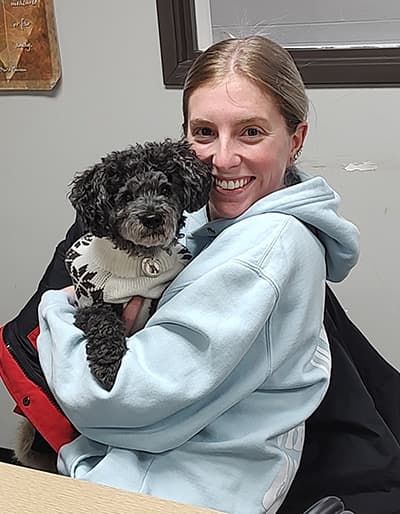 Bentley is a toy poodle who worked in the Student Success Center from 2016 until his retirement this past November. Over the years he has greeted students and employees with open paws and warm kisses, as well as settling anxious minds and longing hearts. Bentley has proctored the exams of many students in the SSC, played fetch in the study room and with a warm welcome satisfied the needs of all who have approached him.
Bentley is a toy poodle who worked in the Student Success Center from 2016 until his retirement this past November. Over the years he has greeted students and employees with open paws and warm kisses, as well as settling anxious minds and longing hearts. Bentley has proctored the exams of many students in the SSC, played fetch in the study room and with a warm welcome satisfied the needs of all who have approached him.
Bentley's profound respect for humanity is expressed in his undying love for every human being he encounters -- radical hospitality at its finest. He consistently approaches humans in his sight, to greet and hope to be greeted in return. He turns no one away and welcomes all.
Bentley is a gentle soul, loving to everyone and always willing to lend a helping paw. As such he has been present at gatherings such as De-Stress events, summer SOAR sessions, Spirit Day festivities and a few soccer and lacrosse games. Bentley has visited class sessions, attended student meetings, been visible at President Town Halls and has even been known to attend a liturgy! He is the first in his family to work in education and stands behind all students with a special love for underrepresented and first-generation students.
Mechthild of Magdeburg, a Christian medieval mystic, wrote of God's creatures, “The day of my spiritual awakening was the day I saw, and knew I saw all things in God, and God in all things."
There is a sacredness to God's creatures. God has been recognized in Bentley by many!
On Friday, Nov. 1, Bentley spent his last day as a therapy dog in the SSC. He is now 13 years old and isn’t quite up to a five-day work week. Thank you to everyone for your great love and acceptance of Bentley. He has been powerfully blessed to have been a part of the fabric of UDM. Words cannot express the gift it has been to him and to me.
The God in Bentley bows gratefully to the God in all of you!
________
2025 is Sr. Sarah Foster’s 22nd year at Detroit Mercy and the Student Success Center. Like her dog Bentley, Sr. Sarah embodies radical hospitality, welcoming and accepting everyone she encounters.
Healthcare is Hospitality
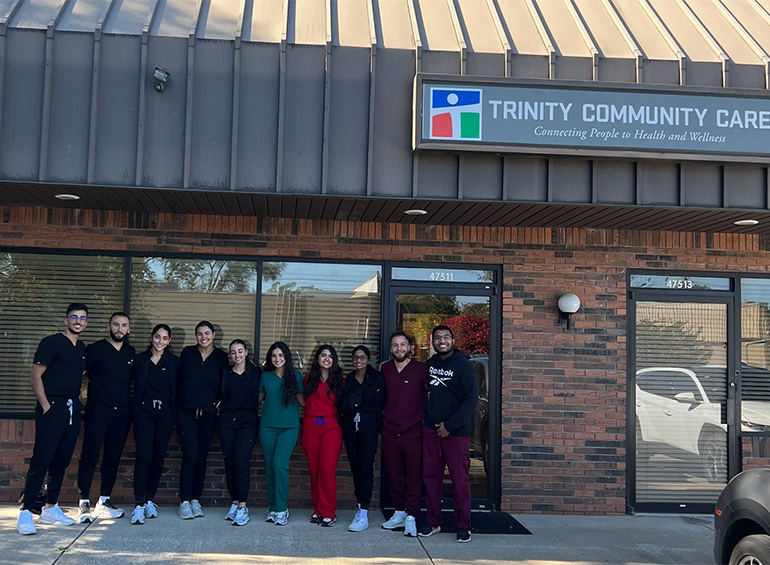 Radical hospitality can thrive in diverse spaces and contexts. At UDM, one of the most significant ways we extend radical hospitality is through compassionate, patient-centered care. In the tradition of the Sisters of Mercy, our faculty and students seek to provide care that honors the dignity of each individual and meets patients where they are. This post highlights one of those initiatives.
Radical hospitality can thrive in diverse spaces and contexts. At UDM, one of the most significant ways we extend radical hospitality is through compassionate, patient-centered care. In the tradition of the Sisters of Mercy, our faculty and students seek to provide care that honors the dignity of each individual and meets patients where they are. This post highlights one of those initiatives.
Since 2013, Trinity Community Care and Trinity Utica Social Outreach Ministry have been a vital part of the Utica, Michigan community, offering essential services including medical care, hot meals and showers. Since 2023, Detroit Mercy’s chapter of the American Student Dental Association (ASDA) has helped extend Trinity’s impact by providing free dental care to those in need. Services include exams, cleanings, radiographs, fillings, extractions and both partial and full dentures.
At Trinity, ASDA members have the opportunity to apply what they’ve learned in the classroom to real-world situations, building clinical skills and professional confidence. Volunteering at Trinity Dental Clinic also allows ASDA members to contribute to individuals’ overall health and well-being, embodying radical hospitality through compassionate care. This experience also gives students a deeper understanding of social responsibility and empathy as they see firsthand the challenges many face in accessing dental care. This is an invaluable lesson in how oral health connects to overall wellness—and a reminder of the importance of serving those who are most vulnerable.
As the next generation of compassionate, service-driven dental professionals, UDM students are committed to building positive relationships and strengthening our local community. Thanks to the leadership of dental coordinator Elyse Argueta-Nava and Christina Fluegge '19, UDM alumna and preceptor at Trinity Community Care, ASDA members have served over 50 patients in the past year.
“Trinity is more than just a healthcare provider," said Fluegge of her experience working with Trinity and ASDA students. "It is a vital resource that helps bridge the gap for individuals and families who might otherwise go without essential dental care. The clinic’s commitment to providing free, compassionate care is rooted in the belief that everyone deserves access to good oral health, regardless of their financial situation. I enjoy guiding the students in their clinical abilities, while also showing them the importance of serving and giving back to the local community.”
A Thanksgiving of Cultural Exploration: Food, Music and Tradition
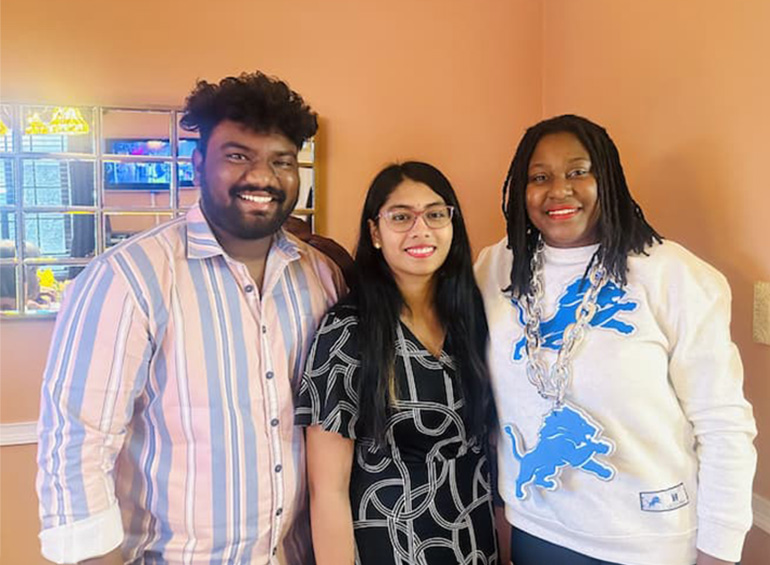 By Ashlee Barnes
By Ashlee Barnes
On November 28, I had the pleasure of hosting Aadarsh and Jamuna, who are international students from India. We hosted Thanksgiving dinner at my family home in Detroit, Michigan. Growing up in this city, I’ve always been surrounded by rich cultural diversity, and this year, I had the opportunity to share a special part of that heritage with my guests.
The experience was as enriching for me as it was for them. These students, far from their families during this time, were eager to experience American traditions firsthand. It was a privilege to welcome them and introduce them to the heart of a Thanksgiving celebration, rooted not only in food but also in prayer, music and stories of family and community.
Their favorite dishes? The turkey and dressing were a big hit—comfort foods that symbolize warmth and togetherness. As we enjoyed tasting all of the flavors in the dishes served, we shared stories about the significance of these dishes in Black culture, especially in the context of the African American experience. Throughout the meal, we discussed how food is not only nourishment but also a powerful way to express connection in the Black culture.
We also took time to reflect on the spiritual aspect of the holiday at my family’s home, giving thanks in a prayer that honored both the day’s traditions and the importance of diversity. The music that filled the air, which was classic soulful tunes, provided another layer of understanding, connecting them to the rhythms and traditions that have shaped Black culture in America.
For me, hosting these students was a reminder of the importance of intercultural exchange. It’s through such experiences that we build bridges between our diverse backgrounds, learning from each other and celebrating the things that make us unique while also discovering the common threads that bind us together. This Thanksgiving was not just about sharing a meal; it was about building connections and deepening understanding across cultures.
As I reflect on the evening, I am grateful for the opportunity to offer these students a glimpse into the richness of Black American culture, while also learning from their own experiences and perspectives. Additionally, my family and I were delighted to learn about their Indian culture and their thoughts on celebrating Thanksgiving in America for the first time. It was a truly meaningful celebration and one that will stay with me for years to come. My family and I are beyond grateful that Detroit Mercy Assistant Director of International Services Alison Roberts presented us with this opportunity.
A Night of Food and Community
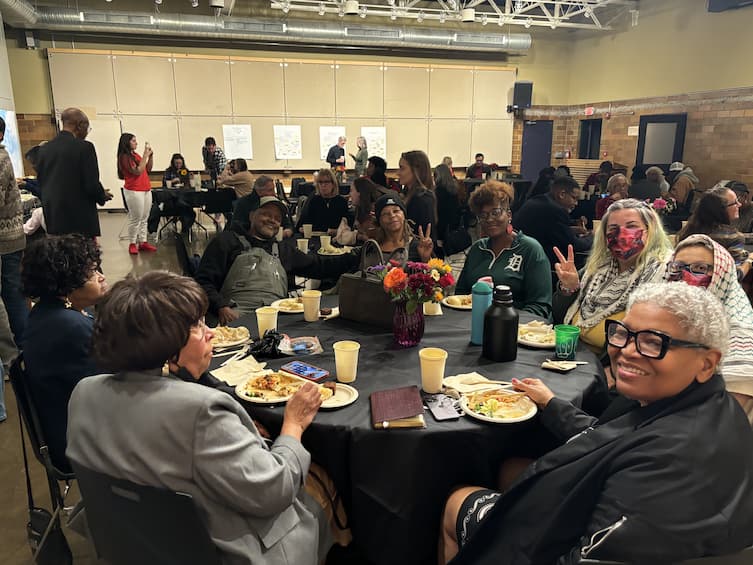 “Sharing a meal isn’t just about the food;
“Sharing a meal isn’t just about the food;
On Nov. 8, 2024, the Titan Equity Nourish Network (TENN) hosted its second annual Community Meal, an event embodying the spirit of radical hospitality. TENN is a student-led, community-driven food justice program that works to address challenges in the food system for more food sovereignty in Detroit.
Central to TENN’s mission is fostering relationships with community partners who guide and support its programming, such as weekly produce deliveries. These partnerships are vital to ensuring that TENN’s initiatives align with the needs of the community. The Community Meal serves as a platform to celebrate and deepen these connections, bringing together TENN’s on-campus and off-campus communities over a shared meal.
This year’s meal was catered by volunteer Chef Bob with the assistance of dedicated student volunteers who helped prepare the dishes. The event drew 67 attendees, including university staff, faculty, alumni, students, the Band Club and community members from groups such as the Martin Park neighborhood, the Princeton Street Block Club, Theresa Maxis Senior Apartments, Gesu and Ss. Peter and Paul parishes.
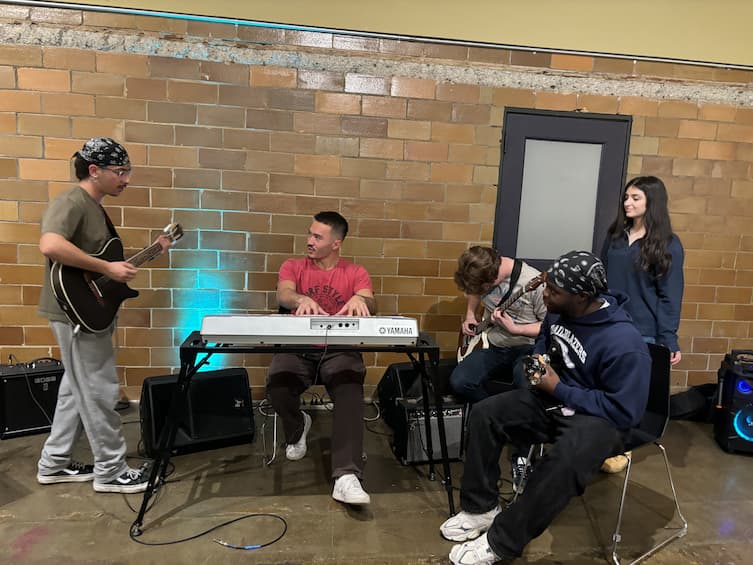 Gwen Knowles, president of the Princeton Street Block Club, shared: “It was an honor to be a part of the 2024 Community Meal. The event was a joyful, especially timely communal celebration, which encouraged new, diverse connections and celebrated seasoned friendships, all while surrounded by groovy music, Chef’s delicious food and genuinely great vibes. Thank you TENN!”
Gwen Knowles, president of the Princeton Street Block Club, shared: “It was an honor to be a part of the 2024 Community Meal. The event was a joyful, especially timely communal celebration, which encouraged new, diverse connections and celebrated seasoned friendships, all while surrounded by groovy music, Chef’s delicious food and genuinely great vibes. Thank you TENN!”
The evening was about more than enjoying good food, it was about building trust, fostering collaboration and celebrating community and connection. By creating a space for dialogue, laughter and togetherness, the Community Meal strengthened ties with existing partners, facilitated new connections among groups with shared goals and reaffirmed TENN’s commitment to a united and empowered community.
A Space for Support
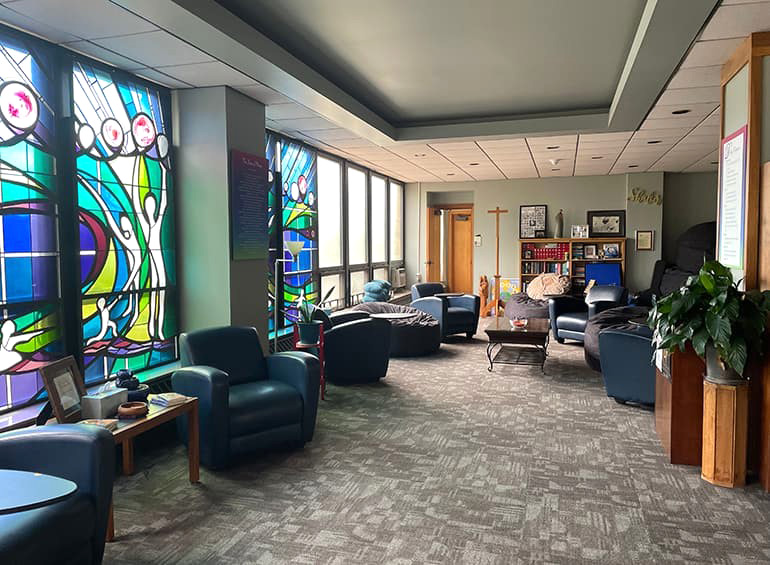
“Be the one who, when you walk in,
blessing shifts to the one who needs it most.
Even if you've not been fed,
be bread.”
― Rumi
On Oct. 1, 2024, students from across the University affected by war in the Middle East were invited to the Mercy Gathering Place to grieve, support one another, and share in community with fellow students, faculty, and staff. For over seven hours, faculty and staff members gathered in the space on the 1st floor of Shiple Hall, helping to create a safe environment and give students a chance to speak and be heard. This event embodied radical hospitality in the face of suffering, fear, and grief. It spoke to the profound impact of being present for and with each other.
Prof. Hiba Assi, Prof. Marwa Latif, Prof. Prasad Venugopal, and Fr. Charles Oduke, Vice President of Mission Integration, helped organize the gathering. Here, Profs. Latif and Assi share their thoughts on what it meant to them to create a space for care and mutual support on the McNichols campus.
Prof. Marwa Latif: “This gathering was a way of acknowledging on-going events and reflecting on the impact of silence towards our students, faculty, and staff with various social, cultural, and ethnic identities. There were students with identities that were directly impacted, but also students and community members who were grieving for the well-being of the close friends or the humanity in the global community. The conversations we had included how Detroit Mercy can play a role in creating a refuge for other students and community members who feel excluded or persecuted at other universities.”
Prof. Hiba Assi: “I want to thank the faculty members and staff who volunteered to be present in the Tuesday support space. I am grateful for their response to the call for community. This gathering was immensely needed, as many students and community members are hurting and aching to be seen and heard. The need for this call and the nature of the response serve as a litmus test for our preparedness as a campus to address the needs of our community in the wake of any traumatic event.”
